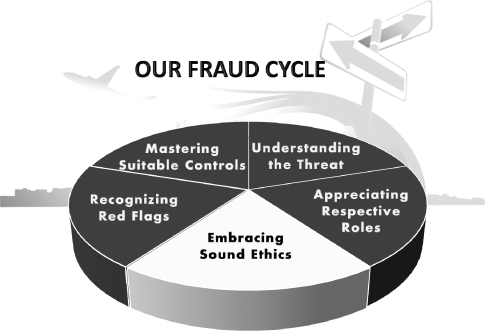9
The Moral Compass
We are now in Part III of the book, which is about embracing sound morals at work.
As you are aware, this book is based around the Fraud Smart cycle, which covers five key aspects of helping non-specialists get to grips with fraud at work. This is repeated in Figure 9.1.
Figure 9.1 The Fraud Smart cycle.

This chapter sits within the third part of the Fraud Smart cycle, Embracing Sound Ethics, and covers the idea of a moral compass to point people in the right direction.
WHAT CAN GO WRONG?
Business ethics is much discussed as the straightforward concept of behaving honestly. But in truth, this idea of honesty can get very murky, as heightened competition calls for more and more aggressive behaviour and the workforce responds by doing everything they can to get a deal. At the same time, the idea of employee security has faded over the years as the corporate model moves away from long-term employment at the same organization to much shorter time frames, which creates a great strain on employee loyalty. If we fail to ensure that the entire workforce is firmly in touch with what the company is about, much could go wrong.
We can consider how problems can arise by looking at two brief illustrative case studies from the UK and the USA. The first is from the education sector.
CASE STUDY
The reputation of a crucial government-backed league table was undermined after two ...

